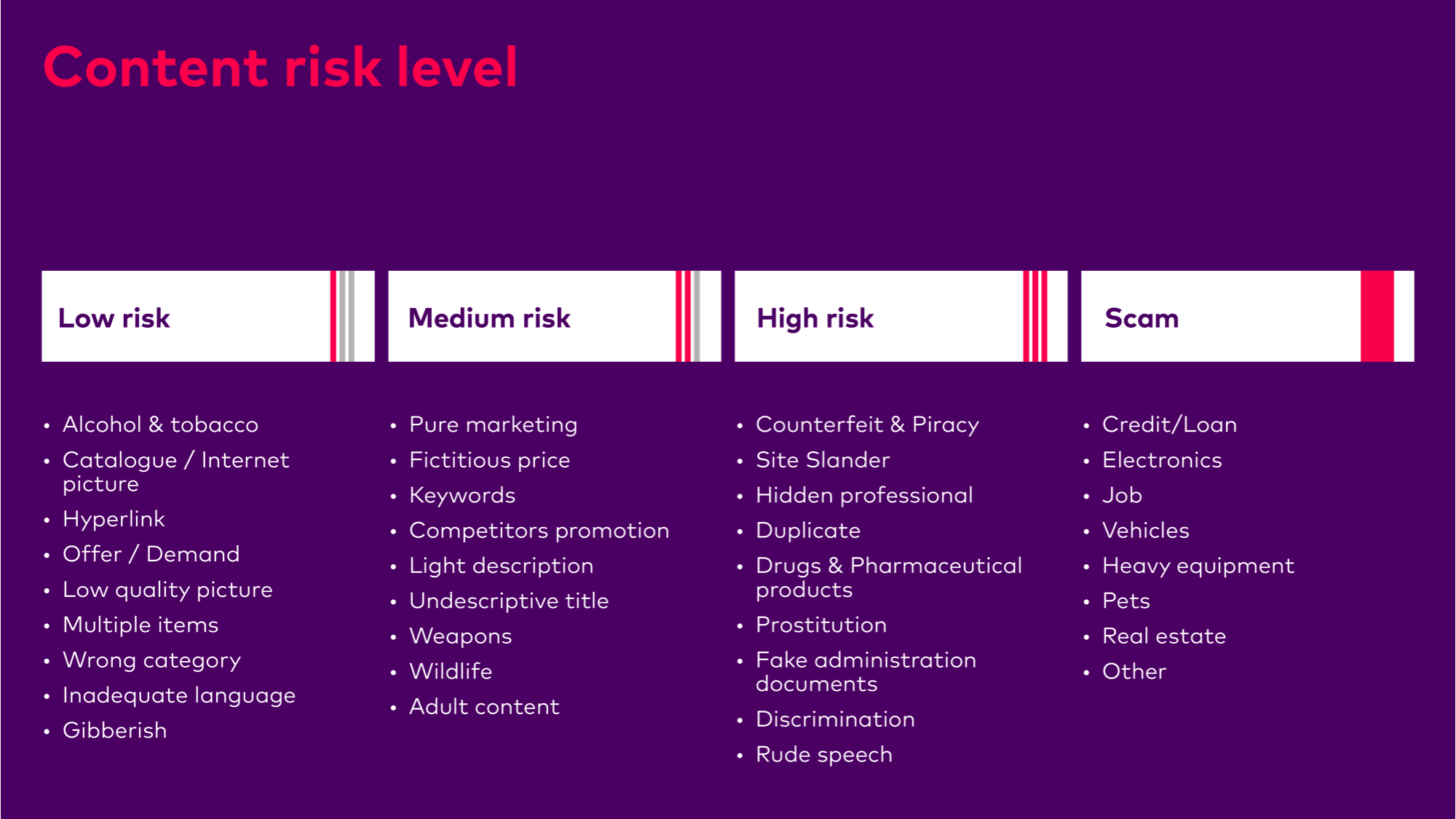Contents
Charlotte Lariven is Besedo’s moderation and trust & safety expert. We caught up with her to find out more about the challenge of keeping track of international scams, researching fraud markers, and ensuring moderators stay one step ahead.
Interviewer: Hi Charlotte! Great to speak with you. Please tell us a little more about you and your role at Besedo.
Charlotte: No problem! I’m Charlotte Lariven, originally from France but now based in Malta. As Besedo’s dedicated moderation and trust & safety expert it’s my responsibility to ensure that all of our internal teams stay on top of online trends, scams, and fraudulent activity. I do this through research, analysis, sharing best practices, and by providing our teams with the insight they need to help our clients improve their processes – globally.
I started at Besedo in 2008 as a moderator, left for a couple of years to work in the gaming industry, but came back in 2012 rejoining as a client team leader, before moving into my current role in October 2017. I’m lucky as I’ve pretty much been able to get a 360-degree view of the challenges facing both our teams and our clients.
Interviewer: Excellent! What skills do you think are needed to succeed in your role?
Charlotte: Having experience of different cultures is a definite strength. I’ve worked with clients who have online stores based in several nations – Belgium, the Netherlands, Czech Republic, Croatia, Slovenia, the UK, and France. And while scammers are at work in all nations, understanding the way they operate in different countries is good insight for my work.
Interviewer: Do you have any examples of how they operate differently?
Charlotte: Sure. In the UK, for example, it’s really normal to advertise the fact that you’re looking for a person to share your apartment (flat) with online. But in France, it’s still quite rare to do that. So while scams involving ‘flat-shares’ are common in cities like London, you won’t generally find them in Paris or Marseille. Things are not stagnant though and we are now starting to see more people flat-sharing in France, which means we now have to start being conscious of flat-sharing on french marketplaces as well. Trends are constantly evolving.
Regardless of where they’re based, scammers follow the trends they see happening around them. This isn’t necessarily a cultural thing, the criteria can be the same globally – for example, we saw quite a few scams prior to the recent Samsung’s S9 phone launch – but fraud makers will vary between nations, so we need to be able to adapt and create different strategies for clients with sites serving a number of countries.
Interviewer: What other factors influence the way scammers behave?
Charlotte: The maturity of a website and specifically the moderation process in place counts too. On websites with light moderation scammers will use more basic schemes, but on sites with more mature processes in place scammers need to get more creative.
Interviewer: Are there any scam trends that have really surprised you?
Charlotte: Definitely! Trojan frauds was a big surprise when we first encountered them some years back. These are when a new user posts their first ad for something very normal – I think baby pajamas was one we’ve seen a few times. It looks harmless, so moderators accept ads like these. And they look genuine. But then a few weeks later, the same user starts posting scams ads, for, say a phone – basically a ruse to get people to send money. But because the account would already be considered a ‘good’ account, it’s tougher to detect it as being associated with fraud.
Interviewer: So how do you tackle a scam like that – from a moderation perspective?
Charlotte: We spent a lot of time investigating these, looking at user feedback and establishing patterns of behaviour. Once we recognised the way the scam works, we were able to determine the fraud markers, and educate our moderation teams. Since scammers keep changing their game, we also keep revisiting these scams to keep up with how they are evolving. It’s a constant cycle.
Interviewer: How do you stay on top of the latest fraud and online security trends?
Charlotte: There’s no secret source of truth; I just spend a lot of time researching trends, reading blogs, and keeping a close eye on things that are likely to be the target for the next big scam.
Cybercriminals are like every other criminal. They’ve just found a way to make something work online. I try to look at scams that happen in the offline work and imagine how that would be applied online and the impact that crime could have on our clients’ sites and users. Because from our experience, most offline scams will move online eventually and we need to be one step ahead of the perpetrators when they do.
A prime example of a crime that has made the move from online to offline is fake documentation – i.d. cards and passports. Also, drug trafficking is a big one.
Interviewer: Really? How do criminals sell drugs online in open public forums?
Charlotte: You’d be surprised how it works! Often they pretend to be a regular pharmacy – only the drugs they’re selling aren’t just the legal variety…
But now online marketplaces are very aware of this kind of activity and most have created a content moderation strategy to deal with it, drug dealers are finding other ways. I saw one on Pinterest recently! They present boards and pictures of drugs or medications, and when you click on the images, you’re taken through to a site offering them for sale. It’s a big problem online.
Interviewer: How do you share new trends like these with clients?
Charlotte: We share our findings internally with different teams: sales, marketing, client management etc.. The latter then forwards all of our insights to our clients. New trends are shared as fast as possible and each month our clients also get a report where we outline key insights from their specific data along with general trends they need to be aware of.
Interviewer: Is there any way you offer up global insights and things you’ve learned?
Charlotte: Actually there are a few things we do. The first is our Scam Calendar – in which we outline a cycle of frequent scams we see at specific times of the year. Christmas is the most obvious, but there are plenty of other annual events that scammers focus in on. Seasonal holidays and global events are high volume times for online marketplaces, so our aim is to offer a useful guide for when moderation teams are at their busiest, to help them to see differences between good and bad content.
Interviewer: And there’s a Besedo Index too, isn’t there? Could you tell us more about that?
Charlotte: That’s right. Besedo Indexes are big studies we’ve done in the past, designed to compare our clients’ activity, and the general quality of their sites, to their most immediate competitors.
We typically compare over 2,500 listings per site and rank each one using a quality model we’ve developed in-house called ‘Besedo Layers’ – which identifies four levels of content risk: Low, Medium, High, and Scam.
It stacks ups like this:

besedo content moderation risk layers.
Typically, low to medium risk material cause for less concern than high risk, however all of these areas impact user experience and/or revenue negatively. And the impact of each area can vary between the sites. However, most clients’ sites are family friendly – which would make the presence of ‘sex toys’ in a ‘toys’ category completely inappropriate (!). The purpose here is not to shame sites that score badly in the index — it’s to create discussions around content and to provide dedicated insights that can help them tailor their moderation strategy moving forward.
We’re currently working on a new one focusing on South American sites; which we’ll make available publically.
Interviewer: There seems to be a lot involved in your work! What’s the best thing about your job?
Charlotte: I’m constantly multitasking so there’s never a quiet moment! I enjoy being a key point of contact between the assignments and the projects Besedo are doing internally to grow the company. In my previous role I was focused on one client; now I get a view of everything!
Thanks Charlotte! For more information on Moderation, Trust, and Safety at Besedo, contact a moderation expert on hi@besedo.com.

Charlotte Lariven
Charlotte started as a moderator and grew with Besedo holding different positions such as shift manager or team leader for various clients; she is now the moderation and trust & safety expert for the organization.
Related articles
See allSee all articlesThis is Besedo
Global, full-service leader in content moderation
We provide automated and manual moderation for online marketplaces, online dating, sharing economy, gaming, communities and social media.
